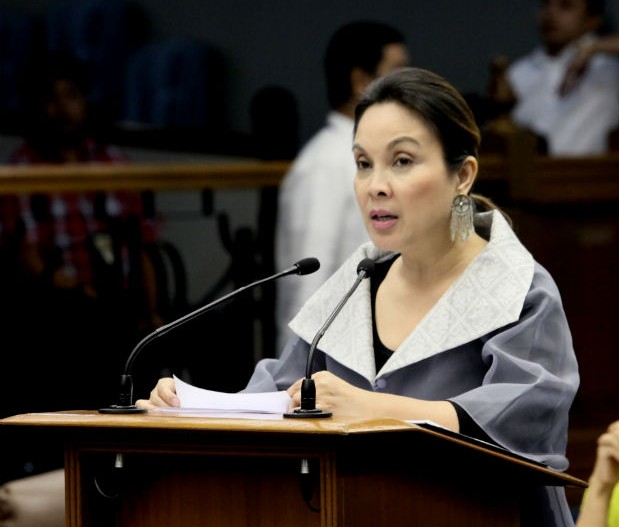Legarda: Why doesn’t gov’t ‘awash with cash’ give funds to farmers?
If they have a government “awash with cash,” why do farmers have to go hungry and get killed while demanding help?
An infuriated Senator Loren Legarda on Thursday reprimanded government agencies in charge of El Niño mitigation efforts for dragging their feet on bringing critical help to farmers enduring the dry spell in North Cotabato, frustrated that it took the Kidapawan City deaths to bring attention to the destabilizing impact of climate change.
Legarda, chair of the Senate committees on finance and climate change, gave several officials a dressing down for failing to bring timely interventions to farmers while several billions in funds were available to help mitigate the effects of the long-anticipated dry spell.
“Here is a clear example of how climate change negatively impacts on agriculture and actually causes loss of lives. [This is] what we’ve been saying 20 years ago. It is so graphic and unfortunate that it took the Kidapawan clash for people to talk about climate justice,” said Legarda.
READ: Cops, farmers clash in Kidapawan; 2 dead
Article continues after this advertisement“You are awash with cash. Why don’t you give it to the people who need it the most? Why is it not being spent?,” an incensed Legarda told the panel of officials across from her.
Article continues after this advertisement“Ang bagal bagal ng gobyerno… ‘Di pwedeng mabagal tayong lahat (The government is so slow. We can’t all be that slow),” said Legarda in an imploring tone.
The senator estimated that nearly P50 billion in funds were available to address the disastrous effects of El Niño, combining available savings and quick response funds (QRF) of the Department of Agriculture (DA), Department of Social Welfare and Development (DSWD) and the National Disaster Risk Reduction and Management Council (NDRRMC) from last year to the current budget.
This includes government’s DRR fund of P43 billion for 2016 and P5 billion in savings from 2015; DA’s P496.6 million in QRF for 2016 and a balance of P11.9 million from 2015, and the DSWD’s P1.6 billion QRF for this year and the remaining P703.6 million in savings from last year.
READ: 6,000 North Cotabato farmers block highway, demand food, farm aid; cops blame activists
“You have not rolled out (projects), and meanwhile, people are getting killed. Where are these billions from 2015 and 2016?,” said Legarda, at one point tapping the table to get her point across.
Breaking the Senate recess, Legarda called for the urgent finance committee meeting among agency officials present on Thursday in the wake of the violent dispersal of protesting farmers in Kidapawan City last April 1, where three people died and scores of others were wounded.
Those in attendance were officials of the DA, DSWD, the Department of Budget and Management, the Department of Interior and Local Government, the Department of Environment and Natural Resources, the Climate Change Commission, the National Food Authority, the NDRRMC and the National Economic and Development Authority (NEDA).
It was “not a hearing,” she clarified, but a meeting that sought to find out why North Cotabato farmers had to take to the streets for government help when funds have long been available.
“That’s really deplorable. Only in this country do you shoot the hungry,” said Legarda, a longtime advocate of climate action.
She scored the myopic leadership stance of “imperial Manila, the imperial central government” for failing to bring help to farmers in far-flung communities when discussions about and preparations for the dry spell began as early as 2014.
“Bakit kayo tipid ng tipid eh ang laki ng pondong hiningi sa amin (Why do you keep on saving up when you asked us for huge funds)? I don’t see the point unless you did not know they needed it, which is impossible because we’ve been talking about it since 2014,” said Legarda.
NEDA Director General Emmanuel Esguerra, among those invited to Thursday’s meeting, said government’s assessment of its El Niño interventions was positive, given that there has been no shortage in food supply, food prices have remained stable and that there has been no outbreak of diseases despite limited water supply in certain areas.
“Government has been able to successfully mitigate the impact of El Niño…But despite these encouraging numbers, we recognize there could be areas feeling the heavier impact of El Niño,” said Esguerra.
“We are certainly bothered by reports that people go hungry when evidence dictates there is no food shortage. This could mean there are areas not reached by government intervention,” he conceded.
In response, Legarda said there is “a seeming maldistribution” of funds, a “clear disconnect” and wrong prioritization in government’s disbursement vis-a-vis the needs of those worst affected.
“We’re supposed to reach out, anticipate, teach them how to access [the funds], instead of waiting for people to go hungry and waiting for them to ask for help. That’s why there’s planning,” she said.
At the close of the hearing, Legarda got officials to make several commitments, including DA’s immediate release of its P11.9-million savings to help farmers amid the drought.
She also requested the agencies to work together to come up with a list of alternative sources of income that could be made available to farmers during times of drought.
“The government can offer climate-sensitive cash-for-work programs such as desilting of rivers, building of barangay (village) nurseries, building water catchment facilities, waste segregation, among others,” Legarda said.
She also asked the agencies to draw up a map showing the “underserved and unserved communities” to enable a more targeted delivery of funding.
Legarda also instructed the DA to draft an easy-to-understand memorandum on how farmers could access available QRF, for distribution to local offices across the country.
“We in government, we’re all about froufrou. We have to operationalize,” said Legarda, challenging the officials to step up.
“We have to roll [these projects] out. It can’t be all just promises,” she said. RAM
